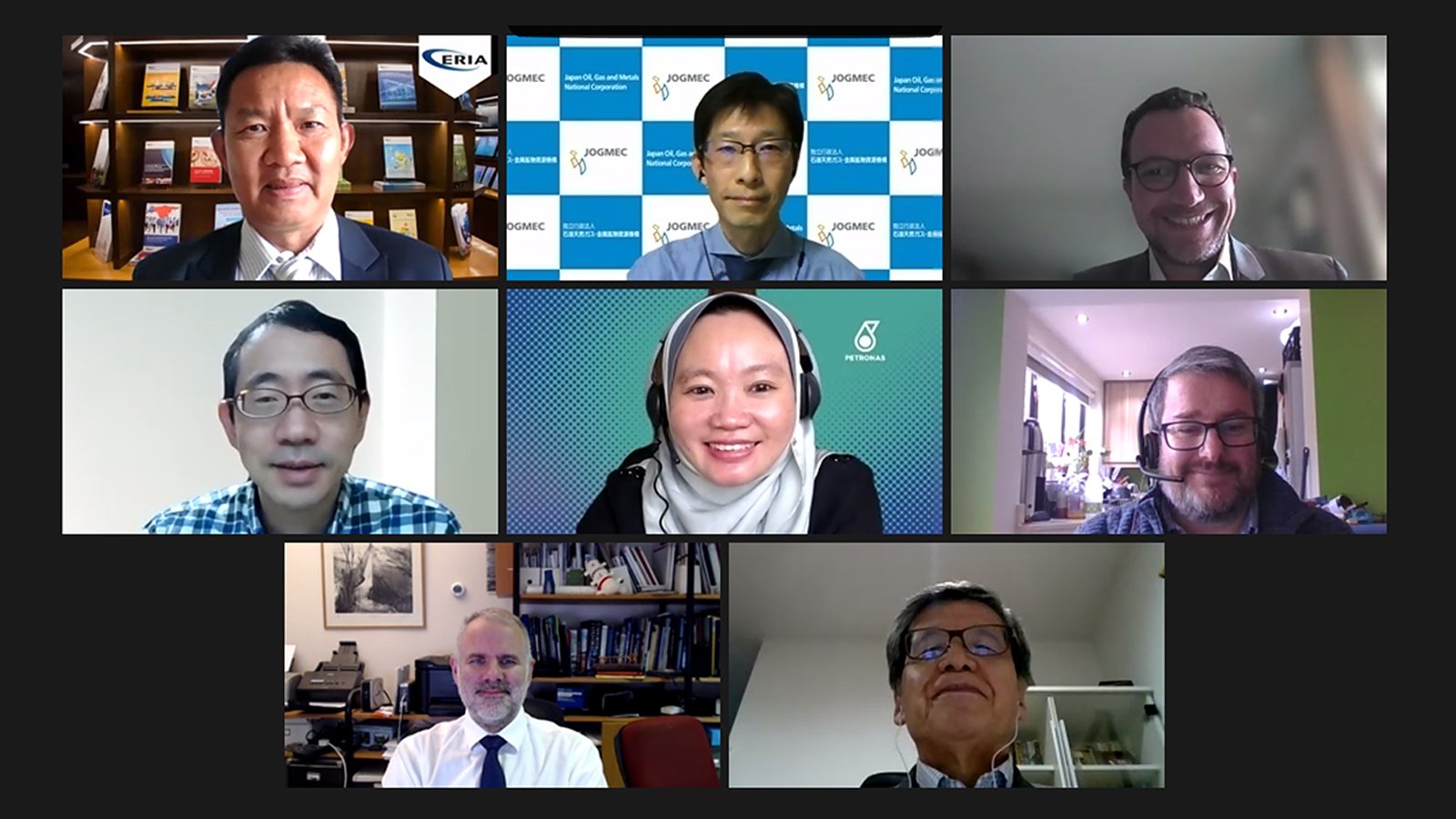The Asia CCUS Network and Oil and Gas Climate Initiative on Overcoming CCUS Deployment Challenges
The 3rd Knowledge Sharing Virtual Conference, 14 October 2021: Governments across Southeast Asia are stepping up decarbonisation efforts with Carbon Capture, Utilisation, and Storage (CCUS) technology becoming an increasingly central focus in policymaking. Numerous studies, including from the International Energy Agency, indicate the significant role CCUS innovation has in the path towards carbon neutrality. As population growth in ASEAN is expected to continue in the coming decades, the region must find a balance between increased energy demand and meeting its Paris Agreement goals.
The Economic Research Institute for ASEAN and East Asia’s (ERIA) Asia CCUS Network (ACN) hosted the ‘3rd Asia CCUS Network Knowledge Sharing Conference’ as part of its ongoing commitment to bridging the knowledge gap on CCUS development and deployment. The Oil and Gas Climate Initiative (OGCI) co-hosted the event during which three of the organisation’s speakers gave detailed presentations on CCUS and carbon dioxide (CO2) storage. Dr Han Phoumin, Senior Energy Economist, ERIA kicked off the event by introducing speakers of the Opening Session.
Mr Taizo Hara, Director General of Research and Policy Design Administration of ERIA delivered his Opening Remarks explaining how knowledge sharing conferences are geared to ‘help policymakers in Asia to speed up the policy development and support CCUS development and deployment.’ He added that these high-tech innovations would further advance the global mission of reaching net-zero emissions by 2050 as well as counter-balance emissions.
Mr Julien Perez, Vice President Strategy and Policy, OGCI began his Opening Remarks with a background of his organisation and its aims towards a carbon-neutral society. With 12 oil and gas companies as its members, including Chevron and Shell, OGCI strives to accelerate the decarbonisation of the oil and gas industry and for the industry to offer solutions to the rest of the world. Mr Perez stated that CCUS has ‘become a critical component to deliver a well below 2˚C world.’ He concluded his speech by highlighting how 10 years is the time required to develop a CCUS project thus the world has to act now, and that the ACN ‘will be a critical partner’ for the OGCI to roll out its initiatives.
Mr Iain Macdonald, CCUS Workstream Lead, OGCI gave a brief presentation about the ‘Introduction of OGCI’ where he shared the organisation’s hubs study to kickstart the CCUS industry. A key result from their study indicated that Asia has approximately 60 hubs spread out across 10 countries that emit nearly three gigatons of CO2 annually. Mr Macdonald shared a positive CCUS deployment outlook for Singapore, Japan, and South Korea in the East and Southeast Asia regions. OGCI plans to conduct a study on CCUS development for countries that do not yet have CCUS regulations or policy support, and how the organisation can facilitate its feasibility. Mr Macdonald explained that countries in Asia will need to engage in transportation and storage collaboration with neighbouring countries to realise the region’s CCUS potential.
Mr Owain Tucker, Storage Working Group, OGCI provided a technical presentation on CO2 storage covering topics such as legacy wells, hydrocarbon maturation, aquifers, and carbon capture, utilisation, and storage (CCUS). Part of CCUS deployment is to ensure that the CO2 remains in the storage area and that there are no leakages and that operators must also show governments and stakeholders that the CO2 can be properly stored. However, Mr Tucker explained that a mediation or corrective measure plan is required for companies to have as it establishes an action plan for circumstances where leakages occur. As part of CCUS development, companies must assess five core components before moving forward with its deployment: (1) Capacity, (2) Containment, (3) Transport and Injectivity, (4) Monitoring and Remediation, and (5) Stakeholders.
There have been discussions on utilising depleted oil and gas fields to begin the initial phase of CCUS projects in Asia given that data and information from previous exploration, appraisal, and production of the sites are available. Mr Tucker underscored the importance of analysing the geological system of the sites, adding that ‘you can always reuse the geology as long as you have not left too many of those holes in and the plugs in the wrong places.’
Mr Tucker additionally gave a presentation of Shell’s Quest project in Canada which has captured, transported, and safely stored more than 6.5 million tonnes of CO2. The Quest project proved the capital-intensive side of CCS and CCUS technologies, amounting to $1.35 billion, and Mr Tucker credited the funding assistance from the governments of Alberta and Canada totalling CND $865 million for facilitating its development. Through continuous upgrades and assessments, the Quest facility has achieved smooth operations with 98% reliability and realised capture and monitoring costs that are below expectations since it opened in 2015.
Dr Hiroshi Okabe, Director, Reservoir Evaluation Team, CCS Group and Director, EOR Division, Technology Department, Japan Oil, Gas and Metals National Corporation (JOGMEC) and Ms Noriani Yati Mohamad, Head, Resource Development & Management-Sarawak, Malaysia Petroleum Management, Petronas offered their commentaries regarding the presentations. Dr Okabe praised the presenters for their in-depth overview of CCUS and for sharing industry findings based on OGCI members’ work. He added that while depleted oil and gas fields offer one possible path to launching CCUS projects in Asia, he concurred with Mr Tucker in conducting further assessments of its geological system to ensure its readiness as a storage site.
Ms Yati Mohamad expressed her concern over the capital-intensive aspect of CCSCCUS projects even though the Quest project has shown operating cost reductions over time. As such, she underscored the importance of collaboration and innovative technology to reduce costs by at least 30% to make these projects economically feasible, and to encourage CCUS deployment. Ms Yati Mohammad added that although oil and gas companies like Petronas are supportive of reducing emissions and promoting sustainability, profitability is a component of any business endeavours including with CCUS projects.
Dr Phoumin opened the floor of the Open Discussion Session with the topic on cost reduction for CCS and CCUS technologies. Based on his experience, Mr Tucker has found that costs will be lowered as more CCUS projects are built. ‘The second you build more projects, innovation starts to come in and the ability to mature other ideas come in,’ he commented. Mr Macdonald referred to the alternative cost reduction solution of sharing transportation and storage fees through hubs. He explained that ‘new technology will come along but let’s not wait for it. Let’s get the policies in place and governments to allow us to kick-off and that will drive those new technologies even quicker to be integrated into the current technology.’
Regarding specific government support to accelerate CCUS deployment, Mr Tucker emphasised storage legislation that can dramatically change the costs of the entire CCUS value chain. ‘Different ways of setting up your legislation can dramatically inflate or reduce costs,’ he commented. Mr Okabe shared that the government of Japan offers financial support and assistance for pilot tests. Furthermore, discussions on carbon tax and incentives are also underway in Japan to further spur the wider development of this integral innovation. For Malaysia, the government did not offer incentives for the development of Petronas’ Kasawari CCS project, according to Ms Yati Mohamad. The project was instead funded through the company’s production sharing contracts. Ms Yati Mohamad remains optimistic that the government of Malaysia will offer incentives, carbon tax, or carbon policies in the coming years after the country recently announced its net-zero aspirations for 2050.
Mr Shigeru Kimura, Special Advisor to the President on Energy Affairs, ERIA provided the Closing Remarks by thanking the OGCI for the event’s collaboration and seeks to deepen the partnership further. Mr Kimura encouraged the region of Asia to remain steadfast in its decarbonisation efforts by initiating CCS and CCUS deployment, utilising clean energy alternatives, and facilitating energy efficiency measures.

